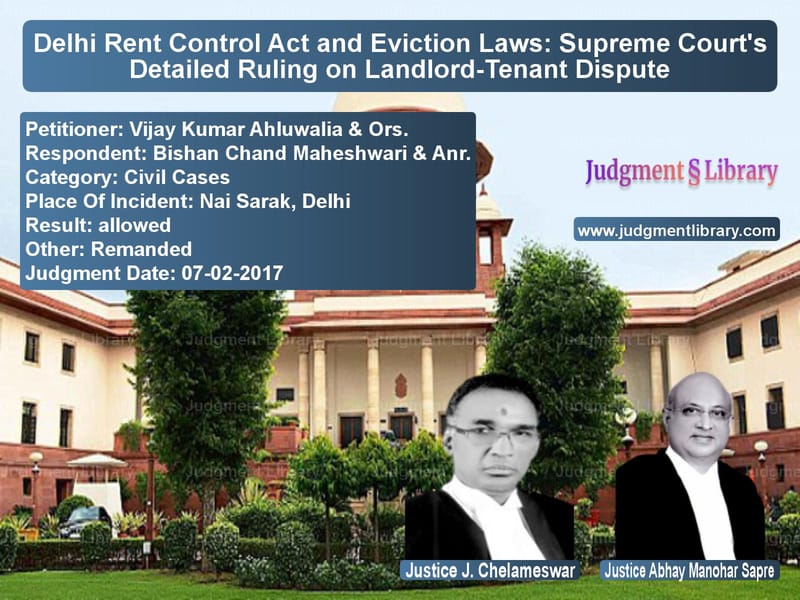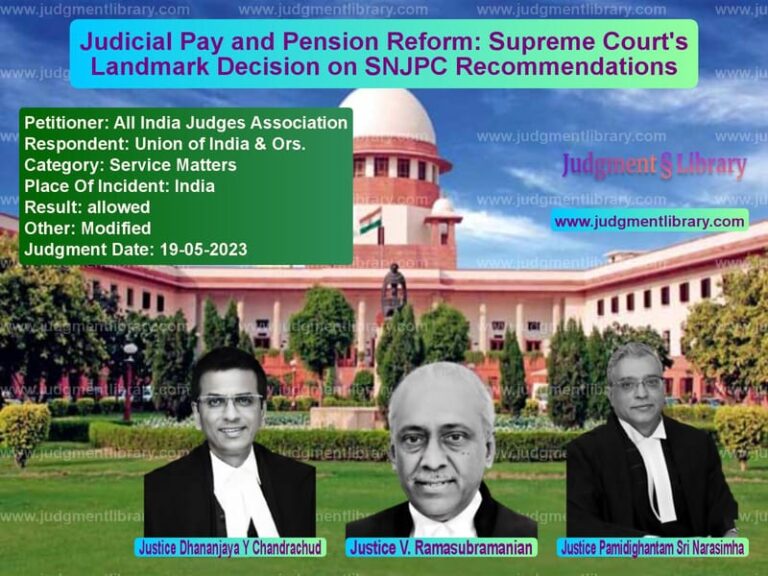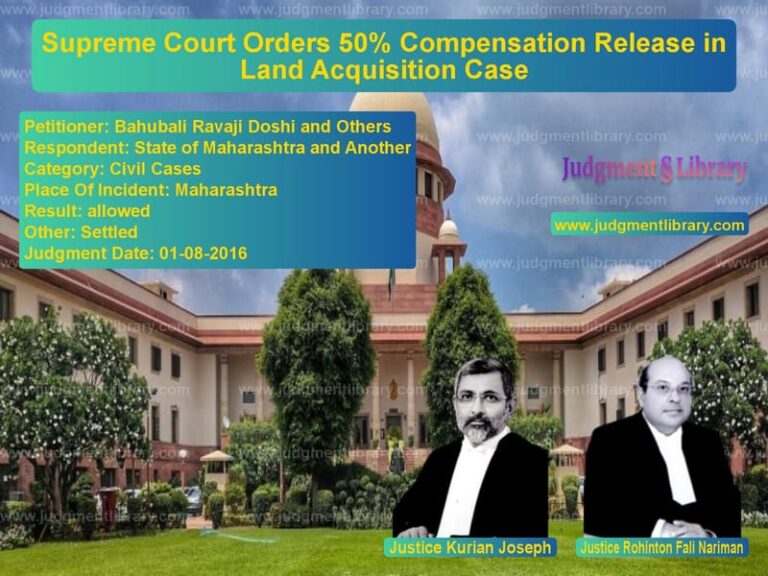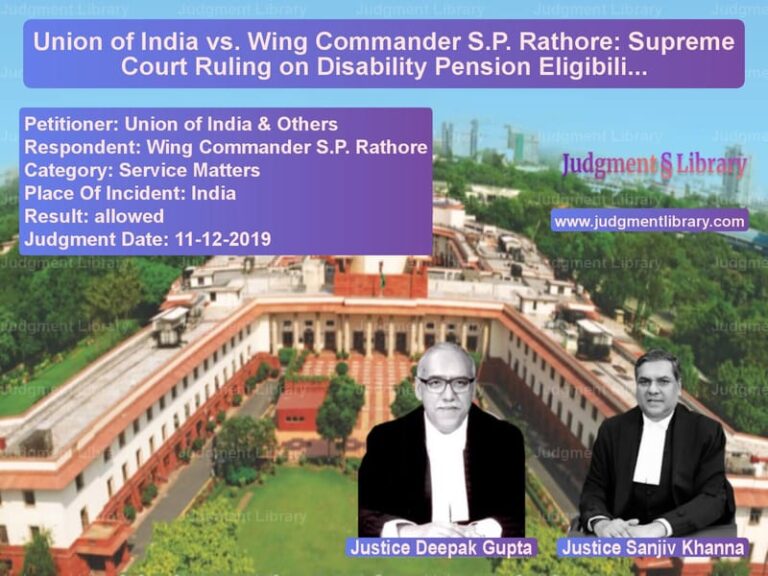Delhi Rent Control Act and Eviction Laws: Supreme Court’s Detailed Ruling on Landlord-Tenant Dispute
The Supreme Court of India delivered a crucial judgment on February 7, 2017, in the case of Vijay Kumar Ahluwalia & Ors. vs. Bishan Chand Maheshwari & Anr., concerning the rights of tenants under the Delhi Rent Control Act, 1958. The central issue was whether a tenant should be granted leave to contest an eviction petition filed by a landlord under Section 14(1)(e) of the Act. This section allows landlords to seek eviction for their bona fide personal need.
The Supreme Court ultimately ruled in favor of the tenant, emphasizing that if a prima facie case is made out, the tenant should be given a fair opportunity to contest eviction. This judgment sets a precedent for cases where landlords attempt to evict tenants without allowing them to present valid defenses.
Background of the Case
The dispute pertained to a shop located in Nai Sarak, Delhi. The property was originally owned by Miri Mal, who had leased it to Ram Prakash in 1944. Following Miri Mal’s death in 1974, his widow, Ram Piari, inherited the shop and continued collecting rent from Ram Prakash. The tenant, Ram Prakash, passed away in 1989, and his son, Vijay Kumar Ahluwalia (appellant), took over the tenancy.
After Ram Piari’s death in 1994, respondent No.1, Bishan Chand Maheshwari, claimed to be her adopted son and filed an eviction petition in 2011, almost 17 years later. He cited his bona fide need for the shop to start his own business and sought eviction under Section 14(1)(e) of the Act.
Tenant’s Arguments
The appellants (tenants) opposed the eviction and applied for leave to contest under Section 25B(4) of the Act, citing the following reasons:
- Ownership Dispute: The appellants challenged Bishan Chand Maheshwari’s claim of ownership. His adoption deed dated March 14, 1978 was brought up for the first time in these proceedings, and the appellants argued that its authenticity was questionable.
- Landlord-Tenant Relationship: The appellants contended that they had never attorned to respondent No.1 as the landlord. There was no prior record of any rent being paid to him.
- Alternative Accommodation: The appellants argued that the landlord had sufficient alternative commercial space in the same building, making eviction unnecessary.
Landlord’s Arguments
The respondent countered these claims, asserting:
- The adoption deed was legally valid, making him the rightful owner of the property.
- The shop was required for his bona fide personal use as he wished to start his own business.
- The tenants were raising baseless objections only to delay the eviction process.
Decisions of Lower Courts
The Additional Rent Controller, Delhi, rejected the tenant’s request for leave to contest and granted an eviction order on August 13, 2012. The tenant then challenged this decision before the Delhi High Court, which upheld the eviction order on August 4, 2014.
Supreme Court’s Ruling
The Supreme Court overturned the eviction order, stating that the tenant had raised substantial legal defenses that warranted a full hearing. The key observations were:
- The issue of ownership was not straightforward and needed further examination.
- The claim that the tenant had never attorned to the respondent as a landlord was a valid defense.
- The availability of alternative accommodation was an issue that required evidence and could not be dismissed outright.
The Court emphasized:
“It is a settled principle of law that while considering the grant of leave to contest the eviction proceedings under the Rent Laws, the Authority/Court is not expected to examine the merits and demerits of the grounds raised in the application for grant of leave to contest. If the Authority/Court finds that the grounds raised prima facie disclose a defense which, if accepted, may result in non-suiting the landlord from claiming eviction, the tenant is entitled to obtain leave to contest the eviction proceedings on merits.”
Conclusion
The Supreme Court set aside the eviction order and remanded the case back to the Rent Controller for reconsideration. The ruling ensures that tenants cannot be evicted without due process and reaffirms the principle that eviction cases must be carefully examined before denying a tenant the right to contest.
This judgment serves as an important precedent in landlord-tenant disputes under the Delhi Rent Control Act, particularly regarding claims of ownership and bona fide needs.
Don’t miss out on the full details! Download the complete judgment in PDF format below and gain valuable insights instantly!
Download Judgment: Vijay Kumar Ahluwali vs Bishan Chand Maheshw Supreme Court of India Judgment Dated 07-02-2017.pdf
Direct Downlaod Judgment: Direct downlaod this Judgment
See all petitions in Property Disputes
See all petitions in Landlord-Tenant Disputes
See all petitions in Damages and Compensation
See all petitions in Judgment by J. Chelameswar
See all petitions in Judgment by Abhay Manohar Sapre
See all petitions in allowed
See all petitions in Remanded
See all petitions in supreme court of India judgments February 2017
See all petitions in 2017 judgments
See all posts in Civil Cases Category
See all allowed petitions in Civil Cases Category
See all Dismissed petitions in Civil Cases Category
See all partially allowed petitions in Civil Cases Category







